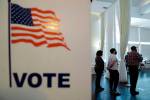Heller committed to fixing financial reform
Now that the effects of the recession are beginning to recede, many people are feeling safer and more secure about the economy again.
But that may be a little premature.
One of the factors that some experts believe may have contributed to the financial collapse and recession was the repeal of the Glass-Steagal Act, the 1933 law that limited the investment activities of commercial banks. And although there’s a replacement law pending, it’s still not in place. Without it, the circumstances that led to the financial crisis and the bank bailout could happen again.
In order to avoid that, some people, including Nevada’s own U.S. Sen. Dean Heller, are calling for a return to the rules found in Glass-Steagall. He said — clearly and unambiguously on the campaign trail — that he wants the old law back.
“I want to move to going back to Glass-Steagall,” then-Rep. Heller said during an October 2012 editorial board meeting at the Review-Journal. (His Democratic opponent, then-Rep. Shelley Berkley, had voted for the repeal of Glass-Steagall under President Bill Clinton in 1999. Berkley said in 2012 that her repeal vote was a mistake.)
Lucky for Nevada, Heller landed himself in the perfect position to start the move to return to Glass-Steagall. He sits on the Senate Banking, Housing and Urban Affairs Committee, as well as on a subcommittee overseeing economic policy and another dealing with financial institutions and consumer protection.
But so far, there’s been no push to restore Glass-Steagall outright. (To be sure, some experts question whether it would even be feasible or possible to do so, after the re-regulation of Wall Street that took place in 1999.)
Further, in a letter this year to a constituent who requested to remain anonymous, Heller wrote, “I want you to know that I have always been a strong supporter of effective reforms in our financial systems, but sensible oversight is need to address the real causes of the financial crisis our nation faces. Responsible policies do not leave taxpayers exposed to permanent bailouts.” Amen to that!
Heller added: “The federal government must instead bolster confidence by enforcing the regulatory authority currently provided in several federal agencies.”
That didn’t sound like wholehearted support for the return of Glass-Steagall. But Heller’s office insists the senator is committed to fixing the system. “Senator Heller met with Senator (Angus) King (I-Maine) about this issue just today,” spokeswoman Chandler Smith wrote in an email last week. “The senator wants to find out the implications of the Volcker rule once it is finalized before signing on to any one of the current Senate proposals.”
The Volcker Rule, named for former Federal Reserve Board Chairman Paul Volcker, was a feature of the 2010 Dodd-Frank Wall Street Reform and Consumer Protection Act. It would prohibit banks from investing in hedge funds, private equity funds or propriety trading that’s not in the interests of customers. But here’s the catch: The rule has yet to be fully implemented and may not be until next year. Moreover, some critics of the Volcker Rule say it has flaws and loopholes that may not achieve its end goal: to prevent another crisis and another bailout of banks deemed “too big to fail.”
But whether it’s the original Glass-Steagall, the Volcker Rule or some entirely new mechanism, it’s clear there is still a problem and that taxpayers are still in jeopardy. Heller should be commended for paying attention to it, even if it’s not a front-burner issue in Washington. He’s consistently described himself as a “small-government, reasonable regulation” type of Republican.
Let’s hope he and his colleagues can come up with a reasonable rule to make us all a little safer.
Steve Sebelius is a Las Vegas Review-Journal political columnist and author of the blog SlashPolitics.com. Follow him on Twitter (@SteveSebelius) or reach him at (702) 387-5276 or ssebelius@ reviewjournal.com.























